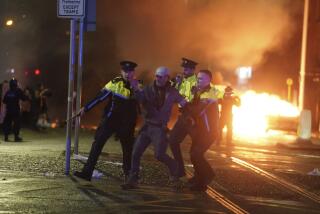N. Ireland Shooting Ends Truce Hopes
- Share via
LONDON — A police officer was seriously wounded by a gunman in Northern Ireland on Thursday, ending hopes that the Irish Republican Army would announce a cease-fire before British national elections May 1.
The shooting in Londonderry sparked fears among analysts that it might reignite full-scale sectarian warfare between Catholic republicans and Protestant loyalists in the angrily divided British province.
The IRA claimed responsibility for the shooting in a coded telephone call to a Londonderry newspaper.
The officer, a member of the Royal Ulster Constabulary, was being treated Thursday night at Altnagelvin Hospital in Londonderry. Doctors described her condition as “serious but stable.”
The wounded officer, who was not immediately identified, was described as a 46-year-old mother of three.
“I heard an awful crack and I knew it was a shot,” a witness told British reporters. “I heard the screams of a girl. . . . Blood was pouring from her chest.”
Police said the officer was in a guard hut outside a courthouse when the shooting occurred. Witnesses said the gunman apparently fired a single shot from a van shortly before 4 p.m.
British Prime Minister John Major and his election opponent, Labor Party leader Tony Blair, denounced the attack.
Rev. Kenneth Best, president of the Methodist Church in Ireland who was in Londonderry on Thursday, lamented the “cowardly, brutal outrage. . . . I cannot find the words to express my dismay at what has happened in this city.”
The IRA, which seeks union of the British province with Ireland, has struck repeatedly since the start of an election campaign in which candidates of Sinn Fein, its political wing, are competing for seats in the British Parliament.
In the past two weeks, bombs and hoaxes claimed by the IRA have disrupted British rail and road networks, wreaking havoc on everyday life and damaging the economy. A threat that turned out to be a hoax in Liverpool on Saturday forced a two-day postponement of the Grand National, the world’s leading steeplechase.
Analysts say the attacks demonstrate the IRA’s continuing ability to convulse Britain after nearly three decades of terror.
Many expected a preelection cease-fire as part of the IRA campaign to force Britain into allowing Sinn Fein a seat at moribund all-party peace talks.
British and Irish media have speculated that the IRA was considering at least a partial truce, and there had been rumors early Thursday that it would declare a cease-fire at 4 p.m.
Sir Patrick Mayhew, the British government’s minister for Northern Ireland, said Thursday’s attack “puts further back the day when Sinn Fein could ever be accepted as a constitutional party.”
Britain says Sinn Fein cannot participate in the talks until there is restoration of a cease-fire that was broken by the IRA in February 1996 with a huge bombing in London’s Docklands district that killed two people and injured several dozen.
Analysts in Belfast now fear that Thursday’s attack might tip the balance toward the full-blown republican-loyalist terror that has so long been the dominant fact of life in Northern Ireland.
“This could be one of the last straws. It was both provocative and reckless,” Irish Foreign Minister Dick Spring said.
More to Read
Sign up for Essential California
The most important California stories and recommendations in your inbox every morning.
You may occasionally receive promotional content from the Los Angeles Times.










